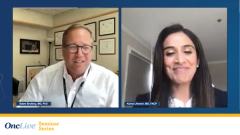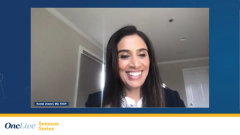
TROPiCS-02: Sacituzumab Govitecan in HR+/HER2- Breast Cancer
A brief review of data from the TROPiCS-02 clinical trial, which evaluated sacituzumab govitecan in HR+/HER2- metastatic or inoperable breast cancer.
Transcript:
Komal Jhaveri, MD, FACP: Let’s quickly talk about TROPiCS-02, and then I have a couple of questions. How do we think about both of these for our patients? TROPiCS-02 is a phase 3 trial of sacituzumab govitecan, which is already approved for patients with metastatic triple-negative breast cancer. But this is a randomized study looking at HR [hormone receptor]–positive HER2 [human epidermal growth factor receptor 2]–negative patients. These were patients who all had at least 1 endocrine therapy taxane and a CDK4/6 inhibitor in any setting. They were allowed to have a minimum of 2 or were required to have a minimum of 2 chemotherapies in the metastatic setting, but no more than 4 lines of chemotherapy in the metastatic setting in measurable disease. Within randomized receiving sacituzumab [govitecan] vs physician choice, the same agents: capecitabine, vinorelbine, gemcitabine, and eribulin. But a primary end point of PFS [progression-free survival] and other secondary end points as listed on the slide. Here are the results for the blinded independent review.
You can see that there was an improvement favoring the sacituzumab [govitecan] arm, but that was rather modest, improving from 4 months in the physician choice to 5.5 months in the sacituzumab [govitecan] arm. However, this was statistically significant: the hazard ratio is 0.66 and the P value is really significant. I’d like to point out that these were all patients who had progressed on prior CDK4/6. This was a patient population that was pretreated median 3 prior lines of chemotherapy in the metastatic setting. That’s important to keep in mind, which also explains this drop in the initial curves you see here, and which is why an appropriate landmark analysis was also done. In the landmark analyses, at a 12-month time point, about 21% of the patient population is progression-free in the sacituzumab [govitecan] arm compared with 7%. Just a third of them are in the physician choice because this is your pretreated patient population and very poor prognostic patient population. When we look at overall survival, these data aren’t mature. This was the first of 3 planned overall survival analyses.
We’re looking forward to additional data for overall survival in future meetings. With respect to other efficacy end points, there was an improvement in overall survival and clinical benefit rate favoring the sacituzumab [govitecan] arm compared with physician choice chemotherapy. But let’s talk about both agents, because NCCN [National Comprehensive Cancer Network] Guidelines have updated that one can use both T-DXd [trastuzumab deruxtecan] and sacituzumab [govitecan] for HER2-low and HR-positive, respectively. How are you thinking about utilizing these agents? Are you planning to utilize them both? If so, how are you thinking about using them?
Adam Brufsky, MD, PhD: Unfortunately, there are no data for ADCf or ADC [antibody-drug conjugate]. But I’ll probably use T-DXd [trastuzumab deruxtecan] first because there’s a survival benefit and a fairly dramatic overall PFS benefit in this setting. I agree that the sacituzumab [govitecan] trial, TROPiCS-02, was much more heavily pretreated than in DESTINY-Breast04. But I’ll probably use sacituzumab [govitecan] second. I’m going to use 1 after the other if I’m allowed to use an ADC. It’s going to be very interesting to see what happens because 1 is a TROP2 antibody, and 1 is a HER2 antibody. Do we know what happens to the expression of 1 if we give another? Do we downregulate TROP2 or upregulate HER2 after TROP2? It’s going to be fascinating to sort this out. Based on the data I’ve seen so far, I’d probably give T-DXd first [trastuzumab deruxtecan] and sacituzumab [govitecan] second in this setting.
Komal Jhaveri, MD, FACP: I completely agree. Maybe you could consider sacituzumab [govitecan] and the HER2 0 group, where we’re still trying to figure out T-DXd [trastuzumab deruxtecan].… We’ve seen some activity in the DAISY trial, but we don’t necessarily have the approval for the HER2 0. Maybe we could think about sacituzumab [govitecan] for those patients. What about triple-negative HER2-low?
Adam Brufsky, MD, PhD: In that patient population, it’s the opposite. In the ASCENT trial, we clearly have a lot of patients. There are many more patients with a survival benefit. It’s a real analysis, not real but it’s a formal analysis; it’s not an exploratory analysis. There are only 60 patients in the ER [estrogen receptor]–negative subgroup of DESTINY-Breast04. In this case, I’d probably give sacituzumab [govitecan] first and T-DXd [trastuzumab deruxtecan] ASCENT trial second if the payers let me. That’s how I’m going to do it.
Komal Jhaveri, MD, FACP: I completely agree with you. We saw some signal from the datopotamab trial, another TROP2 ADC. In those patients, the response rate in the triple-negative group was 34%. Those patients wouldn’t receive prior sacituzumab [govitecan] or prior deruxtecan-based ADC. It was 52%. Maybe there will be differences in potency, and maybe you’ll still be able to get some benefit. We have to address that question more definitively. But if payers give, I agree. I’d try sacituzumab. I’d still try T-DXd [trastuzumab deruxtecan] at the back end for these patients.
Adam Brufsky, MD, PhD: The T-DXd [trastuzumab deruxtecan] payload may be better than the SN-38 payload. That’s 1 reason we think there are probably going to be differences between datopotamab and sacituzumab in this setting.
Komal Jhaveri, MD, FACP: I agree with you completely.
Transcript edited for clarity.









































